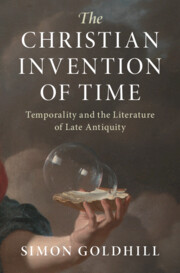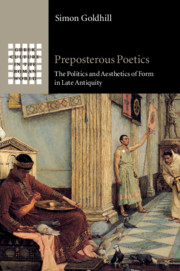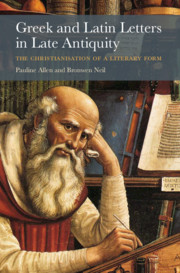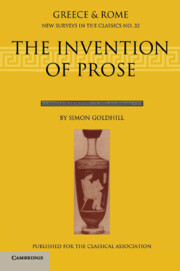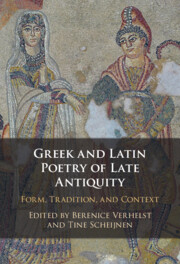The Christian Invention of Time
Temporality and the Literature of Late Antiquity
£39.99
Part of Greek Culture in the Roman World
- Author: Simon Goldhill, University of Cambridge
- Date Published: February 2022
- availability: In stock
- format: Hardback
- isbn: 9781316512906
£
39.99
Hardback
Other available formats:
eBook
Looking for an inspection copy?
This title is not currently available on inspection
-
Time is integral to human culture. Over the last two centuries people's relationship with time has been transformed through industrialisation, trade and technology. But the first such life-changing transformation – under Christianity's influence – happened in late antiquity. It was then that time began to be conceptualised in new ways, with discussion of eternity, life after death and the end of days. Individuals also began to experience time differently: from the seven-day week to the order of daily prayer and the festal calendar of Christmas and Easter. With trademark flair and versatility, world-renowned classicist Simon Goldhill uncovers this change in thinking. He explores how it took shape in the literary writing of late antiquity and how it resonates even today. His bold new cultural history will appeal to scholars and students of classics, cultural history, literary studies, and early Christianity alike.
Read more- Offers the first complete account, through the concept of time, of a fundamental transformation of Western culture
- Enjoyably and informatively traverses the literature of late antiquity
- Brings new perspectives and original understandings to the idea of temporality
Reviews & endorsements
'Though the essays can be read and appreciated separately, Goodhill has done an excellent job of choosing the essay topics: readers gain a solid appreciation for the Christian influence on the narratives of late antiquity and their significance for the development of concepts of time. … Highly recommended.' E. Kincanon, Choice
See more reviews'… Goldhill has a huge amount to teach us about the Christianization of literary genres, especially with reference to time in (generally) the fourth and fifth centuries AD … No review of reasonable length can do justice to the richness of Goldhill's project or its importance.' John Rist, Augustiniana
Customer reviews
Not yet reviewed
Be the first to review
Review was not posted due to profanity
×Product details
- Date Published: February 2022
- format: Hardback
- isbn: 9781316512906
- length: 516 pages
- dimensions: 235 x 159 x 31 mm
- weight: 0.85kg
- availability: In stock
Table of Contents
Introduction
Part I:
1. God's time
2. The time of death
3. Telling time
4. Waiting
5. Time and time again
6. Making time visible
7. At the same time
8. Timelessness and the now
9. Life times
10. The rape of time
Part II:
11. Beginning, again: Nonnus' paraphrase of the Gospel of John
12. The eternal return: Nonnus' Dionysiaca
13. Regulation time: Gregory's Christmas Day
14. Day to day
15. “We are the times”: Making history Christian
Coda: Writing in the time of sickness.
Sorry, this resource is locked
Please register or sign in to request access. If you are having problems accessing these resources please email [email protected]
Register Sign in» Proceed
You are now leaving the Cambridge University Press website. Your eBook purchase and download will be completed by our partner www.ebooks.com. Please see the permission section of the www.ebooks.com catalogue page for details of the print & copy limits on our eBooks.
Continue ×Are you sure you want to delete your account?
This cannot be undone.
Thank you for your feedback which will help us improve our service.
If you requested a response, we will make sure to get back to you shortly.
×
